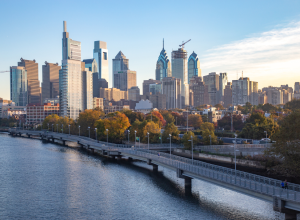Writer: Esteban Pages
 2 min read January 2024 — The prevalence of the remote and hybrid workforce continues to have an adverse effect on office occupancy in Philadelphia’s Center City, with at least four buildings in danger of defaulting on their commercial mortgages due to the diminished leasing income.
2 min read January 2024 — The prevalence of the remote and hybrid workforce continues to have an adverse effect on office occupancy in Philadelphia’s Center City, with at least four buildings in danger of defaulting on their commercial mortgages due to the diminished leasing income.
WSFS Bank Place is the latest Center City case of impending default as San Francisco-based Shorenstein Properties is looking to renegotiate the $223 million loan on the property. Back when the owner first signed in 2021, the building saw 91% occupancy rate, which dropped to 80% a year later as interest rates climbed and the return to office for businesses stagnated to an extent.
According to the Philadelphia Business Journal, Centre Square, the Wanamaker and One South Broad are also distressed properties, and in aggregate owe $530 million in loans to either acquire or refinance the buildings. On average, the occupancy rate for the three properties at the time of loan origination was 91.6%. Today, it has dropped down to 55.6%.
Older, less amenitized buildings are more prone to be on a bind as tenants continue their flight to quality. Modern, energy efficient, collaboration-driven, amenity-focused spaces are becoming the norm for employers looking to attract and retain talent. According to Savills, Class A assets drove 76% of regional leasing activity in 4Q23.
Encouraging signs remain, however, as Avison Young’s Philadelphia Office 3Q23 report shows overall industry growth in the region despite challenges in the commercial space. Office space availability hit a record 22.3% in 3Q23, translation into a drop in asking rents. Negative net absorption cumulated its fourth consecutive year since 2020 and sales volume hit a record low $499 million, a figure not seen since 2008. On the other hand, Greater Philadelphia’s GDP growth continues to be driven by office-using industries, including IT, finance and insurance and professional services. On the talent side, office-using employment rose 8.4% across the region between March 2020 and November 2023, even though office-using job postings dropped 57.2% within that same period. Last quarter showed resilience in leasing activity, as the report highlights both new and renewed leases from Capehart Scatchartd, Lockheed Martin, American Executive Centers, Bethanne Healthcare, and Metcalf Architects. Moreover, the region still has 643,395 square feet of Trophy and Class A office space under development combined.
For older, Class B and Class C types of office assets, Philadelphia’s Center City District sees conversion and redevelopment efforts as an increasingly viable solution. “We have already converted more than 40 or 50 former office buildings in our Downtown to residential use and we have a successful building program for new housing. This has resulted in the third-largest downtown residential population of any major American city, and as more people live Downtown, the streets become more animated, making it easier for people to walk to work,” said Paul Levy, board chair of Center City District in an interview with Invest: last fall.
Center City District also signals that the in-office workforce is making a slow but definitive comeback downtown. “We conducted a survey of 250 firms on their return-to-work policies and 74% of firms are back at least three days a week. The hospitality industry, healthcare and education are back at higher levels than the office sector. To have an inclusive economy, we need to have the maximum number of people back in the office. To address this, we need to focus on rebuilding the social side of the economy, where work is not just a place of work but a social place where friendships and relationships are formed. We need to reinforce all the amenities of the Downtown and our parks to create a vibrant and successful city,” Levy said.
Levy, who served as the president and CEO since CCD’s founding in 1991, is succeeded by Prema Katari Gupta, who oversees all aspects of the CCD’s planning, strategy, economic development, and operations.
Top image provided by the City of Philadelphia
For more information, please visit:
